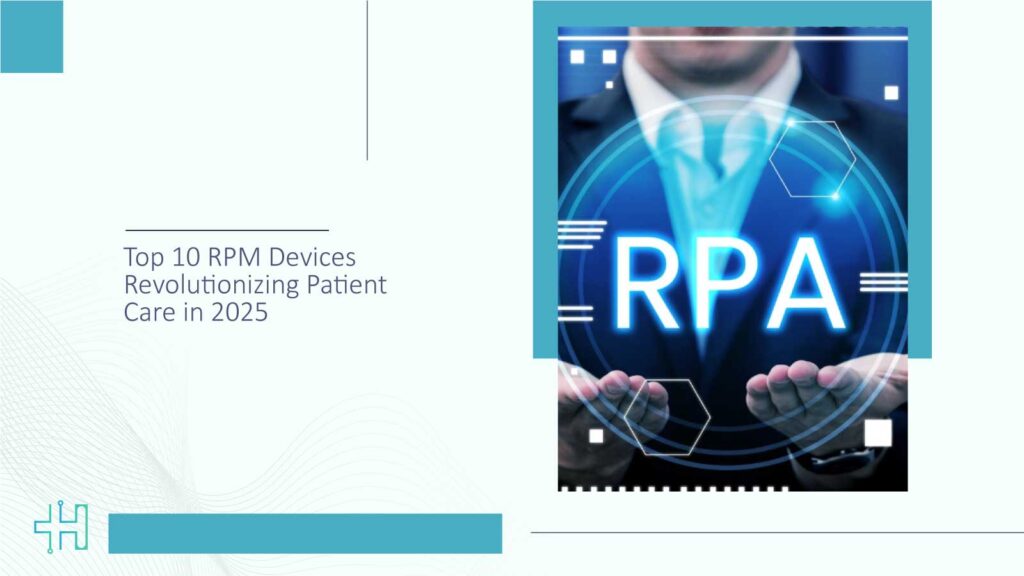With the frequent changes in the medical area, RPM (Remote Patient Monitoring) devices come to the rescue as revolutionizing appliances getting patients the possibility to take care of their health without going out of their houses.
Not only do these innovations attract patient participation, but, also, they make medical professionals capable of delivering up to date and custom care. Determining the leading ten RPM devices reshaping the entire patient care in 2025 is now our task. Before that, let us examine the essence of a remote patient monitoring device.
What is a Remote Patient Monitoring (RPM) Device?
Remote Patient Monitoring (RPM) devices are instrumentalities that enable patients to record and follow up on their vital health metrics at home or anywhere outside the hospital or clinic. These devices gather information like blood pressure, heart rate, glucose levels, oxygen saturation, and more, and share it securely with healthcare providers.
RPM devices allow doctors to monitor the health of patients instantly, identify the occurrence of a disease early, and give the right treatment decisions without frequent hospital visits. Through the rights granted to continuous health tracing and proactive care by RPM devices, patient participation is heightened, thus the rate of hospital readmission is greatly reduced, chronic disease management becomes easier, and therefore these devices become the core of current healthcare.
1. Withings BeamO: The All-in-One Home Health Monitor
Withings’ BeamO is a sleek, remote-control-sized device that consolidates four essential health sensors: body temperature, lung sounds, heart activity, and blood oxygen levels. Designed for at-home use, it allows users to monitor their health and share data with medical professionals for remote diagnoses. Pending FDA clearance, BeamO is set to revolutionize home health monitoring.
2. Nuvo Invu: Wearable Pregnancy Monitoring
Nuvo’s Invu is a wearable device equipped with 12 sensors that track fetal and maternal heart rates and monitor contraction activity. Particularly beneficial for high-risk pregnancies, it transmits real-time data to healthcare providers, ensuring continuous monitoring without frequent clinic visits.
3. Athelas RPM Platform: Empowering Home Healthcare
Athelas offers a comprehensive RPM platform that enables healthcare providers to collect patient data remotely, improving outcomes and generating new revenue streams. Their SIM-connected devices, such as glucometers and blood pressure monitors, transmit health data for review by clinical staff, facilitating early interventions and reducing hospitalizations.
4. Optimize Health: Streamlined RPM Services
Optimize Health provides an advanced RPM program aimed at delivering high-quality experiences for patients and healthcare workers. Their platform offers tools for care teams to engage patients effectively, ensuring compliance with CMS guidelines and maximizing patient adherence.
5. Cadence Care: Personalized Chronic Condition Management
Cadence Care’s RPM platform delivers personalized and responsive care, allowing patients to monitor vital signs daily, including pulse rate, heart rate, blood pressure levels, blood glucose levels, and body weight. Their proactive approach helps identify symptom exacerbations early, reducing complications and hospitalizations.
6. Health Recovery Solutions (HRS): Comprehensive RPM Solutions
HRS offers a suite of RPM solutions designed to improve patient satisfaction, lower hospital readmissions, and reduce clinician workload. Their platform provides customizable tools for patient engagement, including mobile applications and voice response systems, ensuring continuous monitoring and timely interventions.
7. Accuhealth: EHR-Connected Monitoring Devices
Accuhealth provides EHR-connected devices that remotely monitor weight, pulse oximetry, glucose, and blood pressure. Their platform integrates with over 50 leading practice-based EHRs, offering seamless data transmission and 24/7 clinical monitoring, reducing hospitalizations and enhancing patient care.
8. Philips Remote Patient Monitoring: Integrated Care Solutions
Philips offers a comprehensive RPM platform that integrates with their medical devices and hospital equipment. Their solutions are widely used in post-acute care and chronic disease management, providing healthcare providers with tools to monitor patients remotely and deliver integrated care.
9. Medtronic CareLink: Advanced Cardiac Monitoring
Medtronic’s CareLink platform specializes in remote monitoring for heart failure, diabetes, and cardiovascular diseases. Their proprietary devices sync with the platform, allowing healthcare providers to monitor patients remotely and make timely interventions, improving patient outcomes.
10. Lightbeam Health: Deviceless RPM Solutions
Lightbeam Health offers a deviceless RPM solution that aggregates data, including patient-reported metrics, without relying on proprietary hardware. Their approach focuses on population health analytics to identify at-risk patients, providing healthcare providers with insights to deliver proactive care.
Conclusion
The development of RPM devices in 2025 indicates the invention of a new system that will be patient-centered and proactive in nature. Thus these devices by themselves not only increase the quality of care but also empower patients to make decisions about their health. With the ongoing technological progress, the assimilation of RPM devices in daily healthcare routines will definitely bring about better health outcomes and a more efficient healthcare system.
FAQs
Q1: Who can use RPM devices?
RPM devices can be used by individuals suffering from chronic diseases, those who need regular health monitoring under the supervision of a clinician, and those who are in the recovery stage after surgery.
Q2: Are RPM devices accurate?
Most FDA-approved RPM devices offer clinically validated measurements. The accuracy of the measurement may vary by the device and the way it is used.
Q3: Do RPM devices replace in-person doctor visits?
No, it is just a supplementary continuous monitoring system that provides data for clinicians’ decisions. However, essential in-person consultations are not replaced by it.
Q4: Is patient data secure with RPM devices?
Yes, reliable RPM devices are designed to comply with the HIPAA privacy and security standards and any data being sent remotely is always encrypted and securely transmitted.
Q5: How do RPM devices benefit healthcare providers?
Providers can monitor patients remotely, spot potential health risks early, lower hospital admissions, and adjust treatment plans so that the overall health of patients improves.
Keep reading on Health Technology Insights.
To participate in our interviews, please write to our HealthTech Media Room at sudipto@intentamplify.com








